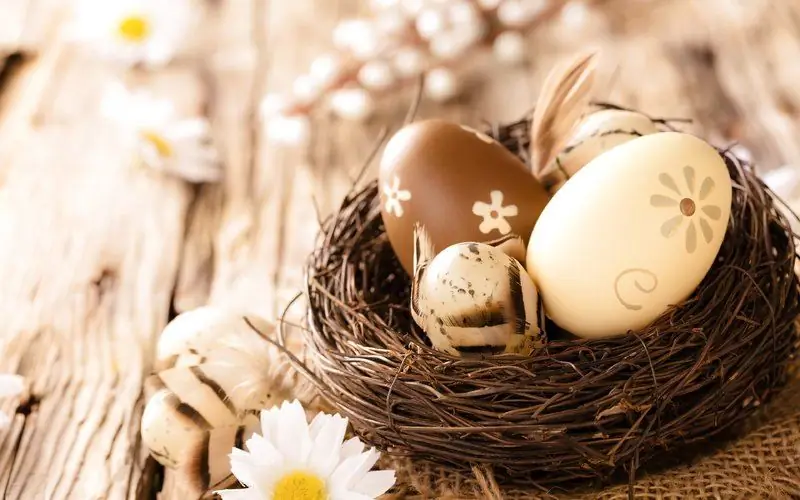
Table of contents:
- Author Bailey Albertson albertson@usefultipsdiy.com.
- Public 2023-12-17 12:53.
- Last modified 2025-01-23 12:41.
9 beautiful plants that really belong in a cemetery

Representatives of all religions ennoble the burial places of relatives and friends, planting a variety of flowers and trees. Traditionally, each culture has its own plants, symbolizing grief and sadness, and most appropriate in the cemetery.
Iris

For Christians, iris is the flower of the Virgin Mary, it, like the lily, was found on the images dedicated to the Mother of God. But if the lily is a symbol of purity, then the iris is the personification of the sadness that filled the heart and soul of Mary, who saw the suffering of her son Jesus Christ.
That is why the flower, which became a sign of pain, grief and death, was often planted near the gravestones. Iris is also associated with rebirth (a person passed away, but remained forever in your heart).
Violet

Violet Greeks considered a symbol of sadness and death. She served as an adornment for the bed and graves of young, untimely departed girls.
According to legend, the god of light and sun Apollo was in love with the daughter of the titan Atlas and annoyed her with his scorching rays.
According to another version, once the daughter of the Thunderer and the goddess Demeter was gathering violets in the forest and was stolen by the god of the kingdom of the dead, Hades. Frightened, Persephone dropped the flowers, after which they began to grow on the ground.
White calla lilies

According to the custom widespread in the Catholic countries of Europe, only white flowers are brought to the funeral. Since calla lilies were originally exclusively white in color, they were brought most often. Over time, they became strongly associated with funerals and "accompany" funeral processions. It is customary for Europeans to plant calla in the cemetery.
It is not accepted to give calla lilies to elderly ladies (can be understood as a hint of a quick death).
Cypress

Cypress is considered a traditional symbol of death and burial in Western culture. It has been called a cemetery since ancient times.
The grief was so great that he asked the sky to turn it into a tree. The gods heeded the requests and turned the young man into a slender cypress tree that remained at the place of his friend's death.
For many peoples, cypress expresses the idea of the eternal life of the soul. Europeans believe that the soaring crown of a tree shows the soul the right path to heaven.
White Lily

The white lily is called the flower of death and the symbol of the Annunciation, the sign of oblivion and loyalty, the emblem of chastity and debauchery.
In ancient Egypt, the white lily was identified with the hope and transience of life. The bodies of deceased Egyptians were removed with delicate flowers. One such mummy with a lily on its chest is still in the Louvre.
Black Rose

In ancient Greece, she personified the short duration of human existence. On the graves of the Hellenes, a rosebud was often depicted, symbolizing infinity.
On the canvases of the painters, a black rose expressed mourning. The lady depicted with such a flower in her hands was a widow.
Carnation

As the legend says, one day Artemis returned from an unsuccessful hunt and saw a shepherd playing the flute, the sounds of which scared all the animals. The enraged goddess killed the musician by firing an arrow into his heart.
According to the traditions of florists, a striped carnation is included in the funeral bouquet as a request for forgiveness from the deceased, if you did not manage to do this during his lifetime.
Periwinkle

An unpretentious evergreen creeping periwinkle personified stamina and vitality, immortality.
It is believed that a flower placed above the entrance to the house is able to scare away evil spirits. Bushes are often planted in churchyards in Europe as a sign of faithful memory and eternal love.
Chrysanthemum

In Europe, a white chrysanthemum is a sign of immense sadness.
In Italy, it means deep grief and loss. In England, the chrysanthemum is intended for burial. In France, wreaths of strict plants are placed on graves. In Japan, it is both the flower of death and the emperor.
According to Chinese legend, a woman's son died. On the way to his place of rest, she collected wildflowers and decorated the grave with them. With the onset of cold weather, she remembered a bouquet of artificial chrysanthemums given to her by her mother. She brought it to her son's grave. Tears of sadness watered the soil and revived the flowers. Their bitter aroma personified all the mother's grief and the pain of her loss.
Recommended:
Why You Can't Go To The Cemetery On Easter

Why is it forbidden to go to the cemetery on Easter? How strict is the ban. When is the best time to go to the cemetery - before or after Easter
Why You Can't Bring Artificial Flowers To The Cemetery

Why artificial flowers cannot be worn in the cemetery: objective reasons, superstitions, the opinion of the Russian Orthodox Church
What Not To Do In A Cemetery And Why

What not to do in the cemetery. Legislative rules of conduct. Signs and superstitions
5 Life Hacks That Don't Really Work

What popular life hacks from the Internet do not actually work
Signs That Indicate What The Other Person Really Thinks Of You

What are the signs that you can understand what the interlocutor really thinks of you
